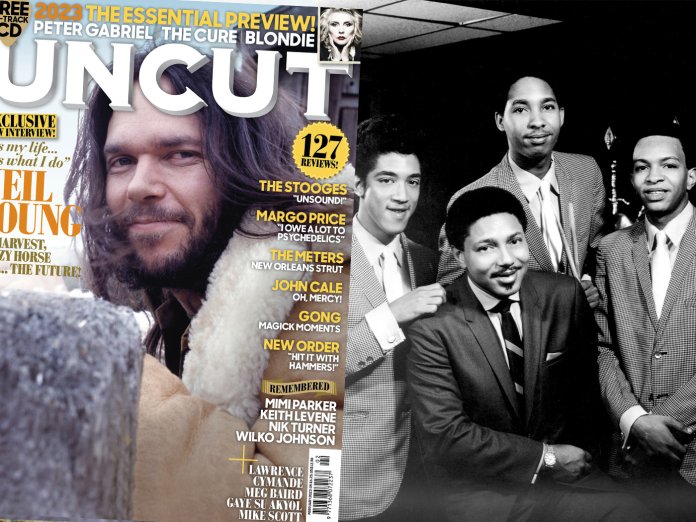Funk session supremo Leo Nocentelli looks back on a stellar career – Uncut takes a look at The Meters’ finest work, in the latest issue of Uncut magazine – in the latest issue of Uncut magazine – in UK shops from Thursday, December 8 and available to buy from our online store.
For much of the past 60 years, the four musicians who make up The Meters have been a constant thread in New Orleans musical history. While still in their teens, all four – Art Neville (piano and organ), Zigaboo Modeliste (drums), George Porter Jr (bass) and Leo Nocentelli (guitar) – were the house band in Allen Toussaint’s studio, playing on big singles by Lee Dorsey, Ernie K-Doe, Betty Harris and Professor Longhair, and touring with Otis Redding. Initially known as Art Neville And The Sounds, they renamed themselves The Meters in 1965 and built up a following as the hottest funk band on the circuit. Paul McCartney and Led Zeppelin hired them to play private parties; The Rolling Stones enlisted them as a support act for six months; and they served as the backing band for everyone from Dr John to Robert Palmer to Labelle.
“The four of us were kinda telepathic,” says guitarist Leo Nocentelli. After they split in 1977, Nocentelli continued a lucrative session career, spending 35 years in California, but moved back to Crescent City six years ago. “Even when I lived out west, I spent a lot of time here,” he says. “I always said I slept in Burbank, but I lived in New Orleans.” Here he goes through some highlights from his and The Meters’ career.
THE METERS
THE METERS
Josie, 1969
The fab four’s debut, filled with wiry, spartan funk instrumentals
NOCENTELLI: We recorded this at Cosimo Studios, on Camp Street, in what is now Jazz City. This was the studio run by Cosimo Matassa, the place where they recorded all those classic songs by Little Richard and Fats Domino and Ray Charles and where I’d played on loads of Lee Dorsey recordings. It was like a second home to me. This album was just a bunch of instrumentals that I had in my head, songs like “Cissy Strut” and “Live Wire”. I used to have trouble naming instrumentals – one was just a little spiky blues riff and I didn’t have a name for it, and I saw “6V6 LA” written on the tube amplifier of an old radio in the studio, so I named the song “6V6LA”! I used to wake up in the night with a riff in my head and I’d have to go into another room, play it on the guitar, record it on tape and write down the chords. The reason why they’re credited to all of us is because musicians make the song. I might come up with a riff, which would sound completely different if it was being played by Tom, Dick or Harry. But, when it went through the filter of Art, George and Zig, it was transformed! For instance, I came up with the riffs for songs like “Here Comes The Meter Man”, but it was transformed by Art’s organ line. That’s how songs are written!
THE METERS
LOOK-KA PY PY
Josie, 1969
Sophomore album featuring the much-sampled funk take on the theme from Oh! Calcutta!
This album was pretty similar in structure to the first one – mainly riff-based instrumentals. “Look-Ka Py Py” was like an old New Orleans chant, I think that was Ziggy’s idea. Man, that one has been sampled a lot by the hip-hop guys! The song “Oh, Calcutta!” I think was introduced to us by a couple of people, who said, “Man, you should record this, it was a hit on Broadway.” We weren’t fans of the original, to be honest – in fact we’d not even heard it until then – but it was some good chord changes to riff over. It was only many years later that I heard a big song on the radio by a singer called Amerie, it was called “1Thing” and it was the biggest R&B hit of the year. It’s based around my guitar and Ziggy’s drums, that’s all. I see this second album and our third album, Struttin’, in the same light, really, although by the time of Struttin’ we’d got more confident doing some vocal tracks, like the “Wichita Lineman” cover. “Hand Clapping Song” was one of Ziggy’s chants, based on an old New Orleans thing. “Ride Your Pony” was our version of a song that Allen Toussaint wrote for Lee Dorsey – I played on the original of that. I think we used to take things that were already pretty funky and make them really funky!
PICK UP THE NEW ISSUE OF UNCUT TO READ THE FULL STORY



